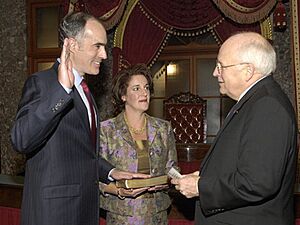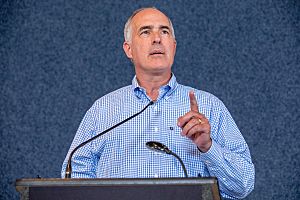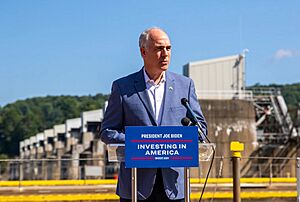Bob Casey Jr. facts for kids
Quick facts for kids
Bob Casey Jr.
|
|||||||||||||||||||||
|---|---|---|---|---|---|---|---|---|---|---|---|---|---|---|---|---|---|---|---|---|---|
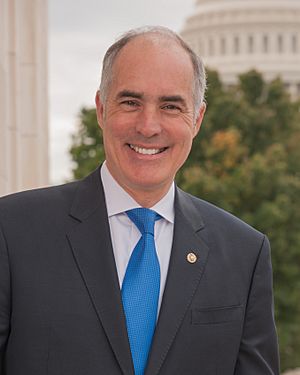
Official portrait, 2016
|
|||||||||||||||||||||
| United States Senator from Pennsylvania |
|||||||||||||||||||||
| In office January 3, 2007 – January 3, 2025 |
|||||||||||||||||||||
| Preceded by | Rick Santorum | ||||||||||||||||||||
| Succeeded by | Dave McCormick | ||||||||||||||||||||
|
|||||||||||||||||||||
| 74th Treasurer of Pennsylvania | |||||||||||||||||||||
| In office January 18, 2005 – January 3, 2007 |
|||||||||||||||||||||
| Governor | Ed Rendell | ||||||||||||||||||||
| Preceded by | Barbara Hafer | ||||||||||||||||||||
| Succeeded by | Robin Wiessmann | ||||||||||||||||||||
| 47th Auditor General of Pennsylvania | |||||||||||||||||||||
| In office January 21, 1997 – January 18, 2005 |
|||||||||||||||||||||
| Governor | Tom Ridge Mark Schweiker Ed Rendell |
||||||||||||||||||||
| Preceded by | Barbara Hafer | ||||||||||||||||||||
| Succeeded by | Jack Wagner | ||||||||||||||||||||
| Personal details | |||||||||||||||||||||
| Born |
Robert Patrick Casey Jr.
April 13, 1960 Scranton, Pennsylvania, U.S. |
||||||||||||||||||||
| Political party | Democratic | ||||||||||||||||||||
| Spouse |
Terese Foppiano
(m. 1985) |
||||||||||||||||||||
| Children | 4 | ||||||||||||||||||||
| Parent |
|
||||||||||||||||||||
| Education |
|
||||||||||||||||||||
Robert Patrick Casey Jr. (born April 13, 1960) is an American lawyer and politician. He served as a U.S. Senator for Pennsylvania from 2007 to 2025. He is a member of the Democratic Party.
Born in Scranton, Pennsylvania, Casey is the son of Bob Casey Sr., who was a former governor of Pennsylvania. After finishing college and law school, he worked as a lawyer in Scranton. He then started his political career as the Pennsylvania Auditor General. He was elected to this job in 1996 and held it until 2005.
In 2002, Casey ran to become the governor of Pennsylvania but lost in the Democratic primary election. After his time as auditor general ended, he was elected State Treasurer in 2004. In 2006, Casey ran for the U.S. Senate and won against the Republican Senator, Rick Santorum. Casey was reelected in 2012 and 2018. In 2024, he lost his reelection bid to Republican David McCormick by a very small difference.
Contents
Early Life and School
Bob Casey Jr. was born in Scranton, Pennsylvania, on April 13, 1960. He was one of eight children of Ellen and Bob Casey Sr., who became the 42nd governor of Pennsylvania. His family has Irish roots.
Casey played basketball at Scranton Preparatory School and graduated in 1978. He earned his first degree from the College of the Holy Cross in 1982. Later, he received a law degree from The Catholic University of America in 1988. Before law school, Casey volunteered with the Jesuit Volunteer Corps. He spent a year teaching 5th grade and coaching basketball in Francisville, Philadelphia. He worked as a lawyer in Scranton from 1988 until 1996.
Starting in Politics
Working as State Auditor
Casey first ran for Pennsylvania State Auditor General in 1996. The Auditor General is like a chief accountant for the state. This person checks how state money is spent to make sure it's used correctly. Casey won the Democratic nomination and then the general election. He was reelected in 2000 and served two terms, from 1997 to 2005.
Running for Governor in 2002
In 2002, Casey tried to become the governor of Pennsylvania, following in his father's footsteps. He ran against former Philadelphia Mayor Ed Rendell in the Democratic primary election. The primary was very expensive. Rendell won the nomination by winning in Philadelphia and its nearby areas. After the primary, Casey supported Rendell, who then won the general election.
Serving as State Treasurer
In 2004, Casey was elected State Treasurer. The Treasurer manages the state's money and investments. He served in this job from 2005 to 2007.
U.S. Senate (2007–2025)
Senate Elections
2006 Election
In 2005, leaders of the Democratic Party asked Casey to run for the U.S. Senate. He decided to run against the Republican Senator, Rick Santorum. Casey started his campaign on March 5, 2005. This was his fifth time running for a statewide office in nine years.
Casey quickly received support from Governor Ed Rendell. Some people thought Casey's views on social issues were too conservative for many Pennsylvania Democrats. However, Casey believed his views would help him gain support from different groups. He won the Democratic primary election in May with 85% of the votes.
On election night, Casey won the Senate race with 59% of the votes, while Santorum received 41%. Casey's victory margin was the largest for a Democrat running for Senate in Pennsylvania.
2012 Election
Casey ran for reelection in 2012. He easily won the Democratic primary. In the general election, he faced Republican Tom Smith. Casey won the election on November 6, with 53.7% of the votes. This made him the first Democrat from Pennsylvania to be elected to a second Senate term since 1962.
2018 Election
Casey won his third Senate term in 2018. He defeated Republican Lou Barletta with 55.7% of the votes. This victory made Casey the first Democrat in Pennsylvania history to win six statewide elections.
2024 Election
Casey ran for a fourth Senate term in 2024. He lost to Republican David McCormick by a very small margin of 0.22%. This was the closest Senate race in 2024. After the election, Casey said he lost because he didn't get enough votes in the Philadelphia area and lost support in rural parts of the state.
Time in the Senate
Casey supported Barack Obama in the 2008 Democratic presidential primaries. His early support for Obama gave him good access to the White House.
Casey was known as a moderate senator. However, after Donald Trump became president in 2017, Casey became more vocal in his opposition to many of Trump's actions. This new approach was seen as a strategy for his 2018 reelection campaign.
Committee Work
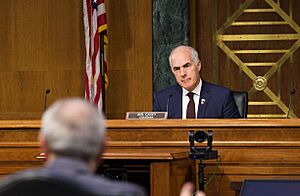
Senators work in different committees to focus on specific topics. Casey was part of several important committees:
- Committee on Finance: This committee deals with taxes, trade, and social security.
- Committee on Health, Education, Labor, and Pensions: This committee focuses on health care, education, and workplace safety. He was the Chairman of the Subcommittee on Children and Families.
- Select Committee on Intelligence: This committee oversees U.S. intelligence agencies.
- Special Committee on Aging: This committee focuses on issues affecting older Americans. Casey was the Chairman of this committee.
Group Memberships
Casey was also a member of the Afterschool Caucuses. These groups bring together senators who are interested in specific issues.
Political Views
Economy and Jobs

In 2014, Casey released a report about income inequality in Pennsylvania. He urged Congress to raise the minimum wage and increase funding for early education. He believed the U.S. should do more to stop other countries from selling steel at very low prices, which hurts American steel companies.
In 2023, Casey introduced bills about how companies use Artificial Intelligence (AI) and watch their workers. One bill, the No Robot Bosses Act, would stop employers from using only AI to make decisions about hiring or firing.
In 2024, Casey introduced the Shrinkflation Protection Act. This bill would prevent companies from making products smaller without also lowering the price. He also introduced the Price Gouging Prevention Act, which would ban "grossly excessive price increases."
Education

As a candidate in 2004, Casey was against school vouchers. He supported using state money to make sure families had access to good, affordable early childhood education programs.
Environment
Casey believed that global warming was a danger. He accused his Republican opponent, Rick Santorum, of not recognizing this threat.
Foreign Policy
Casey worked with other senators to urge the European Union to call Hezbollah a terrorist group. He also introduced a bill to punish countries that allow terrorist financing. Casey voted for a law to stop the U.S. from being a market for stolen ancient items from Syria.
He spoke out against the violence against the Rohingya Muslim minority in Myanmar. In 2019, Casey and other senators wrote to President Trump. They argued that helping Central American countries financially could reduce migration to the U.S. by improving conditions there.
In 2024, Casey voted against a proposal to apply human rights rules to U.S. military aid to Israel. The proposal did not pass.
Government Spending and Taxes
In 2012, Casey introduced a bill to extend a payroll tax cut and give tax credits to businesses that created jobs.
In 2016, Casey joined other senators who wanted to extend benefits for retired coal workers. He said he would vote against a spending bill if these benefits were not continued.
Casey voted against the 2017 Tax Cuts and Jobs Act. He said it mostly helped very wealthy people.
Gun Policy
In 2012, Casey changed his views on gun control. He became a strong supporter of gun control laws. He supported banning assault weapons and improving background checks for gun purchases.
He said that after the Sandy Hook tragedy, his wife and daughter asked him how he would vote on gun issues. This made him think deeply about it. He decided it was unacceptable that the National Rifle Association (NRA) opposed all new gun laws. He then supported common-sense gun measures.
Healthcare
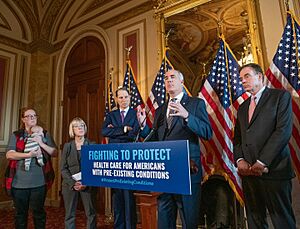
Casey supported President Obama's health reform law, the Patient Protection and Affordable Care Act.
In 2019, Casey helped introduce a bill called the American Miners Act. This bill aimed to protect health care and pension benefits for retired coal miners.
When asked about "Medicare for All," Casey said he supported "universal coverage." This means he wants everyone to have health insurance.
Housing
In 2019, Casey and other senators wrote a letter supporting the Section 4 Capacity Building program. This program helps local community groups improve their neighborhoods. They were disappointed that President Trump's budget planned to cut this program.
Immigration Laws
Casey supported a bill in 2007 that would have created a way for undocumented people in the U.S. to become legal citizens. He also supported continuing federal funds for "sanctuary cities." These are cities that limit their cooperation with national immigration enforcement.
In 2017, Casey protested President Trump's travel ban at the Philadelphia International Airport. He also asked the Homeland Security Secretary to stop the detention of children and mothers at a facility in Pennsylvania. He spoke out against the deportation of a 5-year-old boy and his mother from Honduras who were seeking asylum.
In 2019, Casey and other senators asked for an investigation into federal contractors. They were concerned that some contractors were not providing proper care for children in their facilities.
Judicial Nominees
Casey supported the confirmation of John Roberts in 2005 and Samuel Alito in 2006 to the Supreme Court of the United States.
He voted to confirm Sonia Sotomayor in 2009 and Elena Kagan in 2010 to the Supreme Court.
Casey voted against confirming Neil Gorsuch in 2017, Brett Kavanaugh in 2018, and Amy Coney Barrett in 2020 to the Supreme Court. He had concerns about their judicial philosophies and past opinions.
LGBT Rights
Casey voted for the law that ended "Don't Ask, Don't Tell" in 2010. This policy had prevented openly gay people from serving in the military. He supported civil unions for same-sex couples for a long time. In 2013, he announced his support for same-sex marriage. He also supports same-sex couples adopting children.
In 2019, Casey and other senators asked the United States Secretary of State why the State Department did not issue a statement for Pride Month. They also asked why the special envoy position for LGBTI issues was empty. They believed this signaled that the U.S. was not prioritizing LGBTI rights in its foreign policy.
Personal Life
Bob Casey Jr. and his wife, Terese, got married in 1985. They have four children.
In 2023, Casey received treatment for prostate cancer.
His brother, Patrick Casey, is a lobbyist. A lobbyist tries to influence lawmakers on behalf of a group or company.
Casey is Catholic.
Images for kids
See also
 In Spanish: Bob Casey para niños
In Spanish: Bob Casey para niños
 | Kyle Baker |
 | Joseph Yoakum |
 | Laura Wheeler Waring |
 | Henry Ossawa Tanner |


